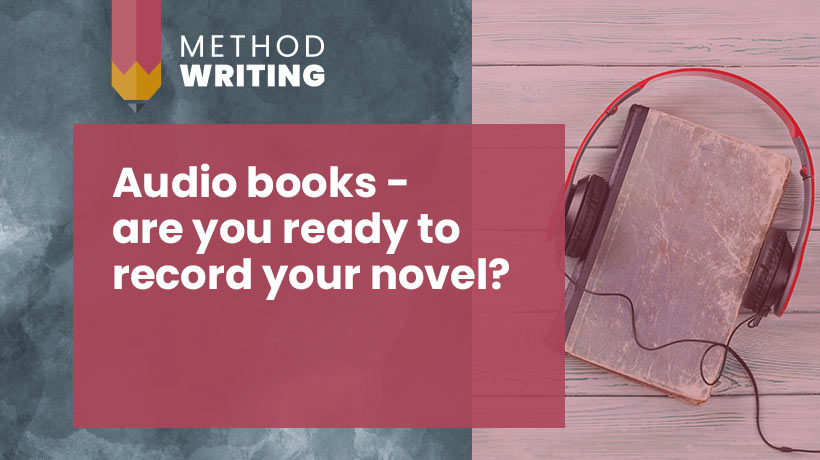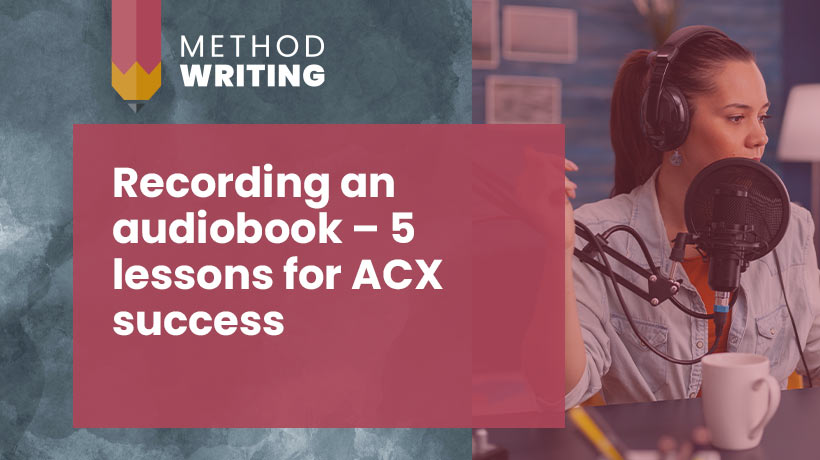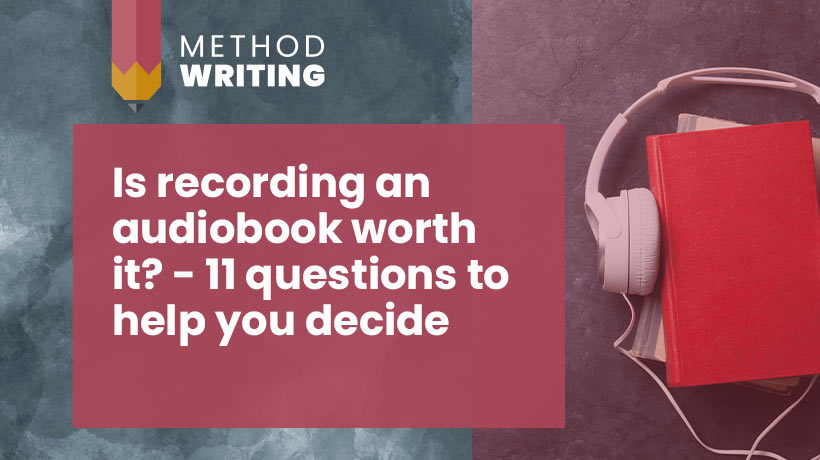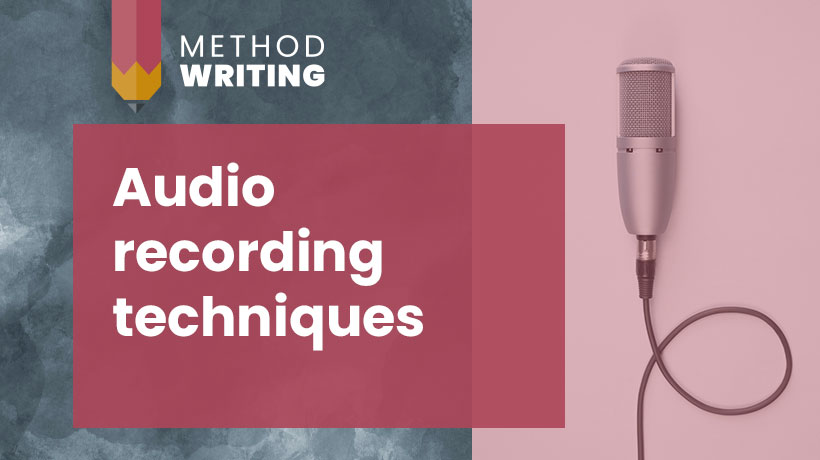Is recording an audiobook worth it?
Is recording an audiobook a worthwhile investment for authors? Are time and money well spent on audio production, or would you be better focusing on other things – such as writing your next book?
I discussed this recently with writer and podcaster Emma Dhesi and it’s such a tricky issue! Every writer is different, and the answer will depend on the stage you’re at, too.
But here are 11 questions to help you think it through. And note that if you love audio and it’s your dream to have an audiobook out, crack on! You might find my book Writing for Audiobooks helpful for the editing stage.
1. Do you have money to invest in audiobook production?
Audiobooks are expensive to produce. Even a 50k novel will take several days of an experienced narrator’s committed time in a studio. It needs to be recorded, edited and mastered so it’s ready for uploading to Audible or one of the other platforms. This calls for close-up, detailed work on every sentence you write.
Yes, costs have come down, as most narrators now have home studios. But even if you go to a relatively inexpensive audiobook provider, or do a profit share where the narrator gets a cut of sales income in return for reduced rates, you’re still looking at a starting point of around £2,000 for basic quality. If you hire an experienced narrator, and have a more complex book involving lots of characters, sound backdrops or other production extras, the sky’s the limit.
If you’re a writing business, look at this with a business hat on. You may well find that new covers, or a professional editor for your book, is a better investment. On the other hand, if you’re a leisure writer and/or you have spare cash and would love to have your audiobook out, this may not be a consideration – in which case, go for it!
2. Do you have time to invest in audiobook production?
The straightforward route is to go to one of the marketplaces where authors can meet audiobook narrators who provide services. The biggest one is Amazon’s ACX, with Findaway Voices also a highly regarded audio-author services market place, for indies who prefer to go wide. Findaway has been bought by Spotify, so audiobook platforms are evolving fast.
If you’re going to an audiobook provider, the process shouldn’t take long. However, a lot of intrepid authors (myself included) have thought ‘how hard can it be?’ and decided to learn their own audiobook narration and production skills.
At this point, I’d urge great caution. I have a radio background, and didn’t find it straightforward at all. But let’s first break it down a little. If you’re like me, you need to ask yourself:
3. Are you a good narrator?
I love doing author readings. I’m good at live reads and get good audience reactions. I’ve also done some drama / public speaking and I’m a natural. My friends say I have a lovely voice...
Stop right there! Narration for audiobooks is a demanding skill. It calls for a close, intimate kind of projection, lively modulation and rhythm and tremendous stamina. Narrators are locked up for hours with your book. Every single fluff and mouth-click needs to be edited out, or it’ll sound dreadful, especially under the repeated scrutiny of a listener with good speakers. An inexperienced narrator with vocal tics and poor microphone technique could mean twice as much studio time, and at least as much again for editing and mastering.
It’s lovely for your ego to have an audiobook recorded by you, the author. In non-fiction, it’s also not uncommon for authors to read their own work. But do consider whether you really want to learn this extra skillset, or whether it’s best to pay someone who has put in the time and possibly years of training to learn it professionally. As with painting your bathroom, DIY can be incredibly satisfying, but doesn’t always get you the best result!
And this applies even more so to the audio production side, where you need to ask:
4. Do you have audio production experience?
Well, I’ve got a few microphones and headsets lying about. I’ve got sound editing software and have edited up audio for home films. I’ve done some podcasting and know about levels and pop shields. My house is reasonably quiet…
Stop right there! Yes, this is a good starting point. However, there’s so much more. First, bear in mind that audiobooks are far less forgiving than podcasting. Podcasting and live radio are usually pacier and have the immediacy and upbeat delivery of live performance. Audiobooks are typically quieter and more intimate in delivery, calling for a different kind of projection and miking.
The main hiccup for me was room tone. Even if your room is quiet, its size and your distance from the mic can still be heard in the recording. When you dial up your volume, you’re also dialling up the room tone. You need to achieve a good ‘signal-to-noise’ ratio and come in under a specific room tone threshold, to have your recordings accepted by ACX. You’ll also need to consider other metrics and ACX requirements, including RMS, bit rate, spacing, and so on.
If this sounds complicated, it means you’ve got some technical learning to do. This isn’t for the faint-hearted, and takes time and a degree of technical interest. If that’s not you, be honest and pass the job on. If you love techie things, you’ll probably love it.
The good news is, there’s no need to record a whole book before finding out whether your recording passes the ACX test. Go to the ACX AudioLab, upload your clip and get feedback. Record a short story and pass the test, before going anywhere near your novel with a microphone.
5. Should you really be writing your book?
Audio production and narrating are great fun, but for some authors, they’re a side swerve from the main job – to write books. They may even become an excuse for procrastination!
So you need to be really honest about whether you want to go down that fun new rabbit hole, or whether you’re at some level procrastinating from a less enticing job, such as line editing your current 200k book.
Bear in mind that, as an indie author, you’re already investing considerable time in learning indie business skills, including marketing, Amazon production processes, self-editing and possibly book design and layout. You’re probably doing courses you haven’t finished yet. These skills alone could keep you busy for years. But your mission is to get your books out to readers.
So ask yourself whether you really need this extra string to your bow. Might it be more efficient to pay an expert?
6. Do you have several books published?
It’s tempting to think the way to make the best of your book is to have it produced in every possible format. Making the best of your IP, right?
This is true only up to a point. You wouldn’t, after all, get a feature film made of your novel, just to cover all the bases (though this would be amazing!). The investment of time and money by an indie author just wouldn’t be worth it.
If you only have a single book, I think it’s best to wait. You’re more likely to recoup your investment from audio when you already have a handful of books, ideally in a series. That way, any advertising works for the series. You’ll also be more experienced as a writer and editor and may want to revisit your first book anyway.
That said, if you have a big mailing list or fanbase already, it’s worth doing the sums.
7. Is your book edit truly ready?
Bear in mind that audiobooks are not just costly to product, but also much harder to edit. Those small editing tweaks – easily made in an ebook – are time-consuming and sometimes impossible in audio. You might find the flow doesn’t work, or the sound quality of the insertion doesn’t match, and the whole section has to be rerecorded.
So you want to be really sure the script (yes, it’s a script!) is ‘locked off’ before it goes to the narrator. This is the process in the film industry and in radio production, and you need to adopt similar professional practices.
8. Is your book in an appropriate genre?
Some books just aren’t a great fit for audio production. They include recipe books, guidebooks with lots of maps and stats, technical publications with graphs, pictures – in short, anything with lots of visuals and numbers. Visuals are obviously tricky in audio, but numbers, too, create problems for listeners. It’s hard to follow a recipe or grasp a stat when it’s a long string of numbers.
In radio writing technique, numbers are usually rounded up or down. Comparisons and sizes are often rendered as metaphors (as big as three football pitches / two London buses / your hand). Get my Writing for the Ear Tipsheet below for more radio writing tips.
9. Does your book need to be more audio-friendly?
It’s likely you’ll need to do some tweaking to help your narrator get the best from the book.
At the very least, read your book aloud and check the sentence length. The written word typically has longer sentences than the spoken word. Sentences can often be broken up, or words cut. For more editing techniques, see the Writing for the Ear tipsheets.
In novels with lots of scenes and characters, you may want to remove dialogue tags (he/she said). Similarly, adverbs such as ‘angrily’ may become redundant if the narrator reads the appropriate emotion into the performance. Removing some of these words will also help to immerse your reader more deeply in the scene, and bring them closer to the characters.
You’ll need to discuss this process with your narrator – what do they prefer? Would they like permission to drop adverbs and dialogue tags where it helps the flow?
Bear in mind, too, that if the audiobook version strays too far from the ebook, it may not be eligible for Amazon Whispersync, the synched version between formats. So it’s a balancing act!
These days, I write with ‘audio-first’ in mind, so the written and spoken text are the same. This saves a lot of editing time.
10. Do you expect financial reward?
The economics of audiobooks are more mysterious than print and ebooks, for several reasons.
The most important factors from a business perspective are (1) Amazon, the market leader, doesn’t allow authors to set their own prices, and (2) as of writing, there’s no way to advertise your audiobooks on ACX.
Note: with print and ebooks, you can market using the Amazon Advertising platform. But you can’t market audiobooks here.
So in this ecosystem, you have no control over who discovers your books, and what they pay for an audiobook. This makes it hard to work out a breakeven, as a basis for planning.
You also have decisions to make about whether to go Amazon exclusive or ‘wide’ (similar to print and ebooks). Genre and whether your readers are also into audio, and what they’re prepared to pay, are further considerations.
So I can’t advise you on whether you’ll make a profit. My guess is that it’s wonderful for a few authors with lots of books published. But the vast majority won’t get near breakeven. So I think the best approach is to see 6 above, wait to see how your first few books go down, and keep on writing for now.
11. Do you love audio?
If you’ve got through these questions and are still keen to produce your audiobook, you’ve passed the test! It’s a fun and extremely satisfying thing to do, and I absolutely don’t want to put you off. But I do want you to think through the pros and cons, and consider whether it’s truly right for your stage, and whether it’s the best use of your time, effort and money.
And if you do go the audio route, don’t just rush in. Pull your book into the best shape and most audio-friendly shape possible, to make the most of your big investment. I highly recommend Writing for Audiobooks or sign up for my free tipsheets, as a way of getting to grips with audio-friendly concepts. It’s full of radio writing advice and will help with editing, too.



